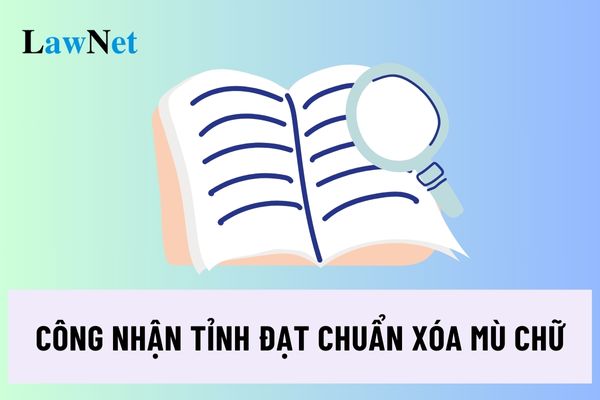Vietnam: What are the levels of recognition for provincial-level standardized illiteracy eradication?
What are the levels of recognition for provincial-level standardized illiteracy eradication in Vietnam?
According to Article 20 of Decree 20/2014/ND-CP, the regulations are as follows:
Criteria for individuals to be recognized as standardized illiteracy eradication at level 1
1. For communes: At least 90% of people from 15 to 35 years old are recognized as standardized literates at level 1 and at least 90% for communes with extremely difficult social-ecomic conditions with people from 15 to 25 years old to be recognized as standardized literates at level 1.
2. For districts: At least 90% of communes are recognized as standardized illiteracy eradication at level 1.
3. For provinces: At least 90% of districts are recognized as standardized illiteracy eradication at level 1.
According to Article 21 of Decree 20/2014/ND-CP, the regulations are as follows:
Criteria for individuals to be recognized as standardized illiteracy eradication at level 2
1. For communes: At least 90% of people from 15 to 60 years old are recognized as standardized literates at level 2 and at least 90% for communes with extremely difficult social-ecomic conditions with people from 15 to 35 years old to be recognized as standardized literates at level 2.
2. For districts: At least 90% of communes are recognized as standardized illiteracy eradication at level 2;
3. For provinces: There must be 100% of districts recognized as standardized illiteracy eradication at level 2.
Thus, the two levels of recognition for provincial-level standardized illiteracy eradication in Vietnam include:
- Level 1: At least 90% of districts are recognized as standardized illiteracy eradication at level 1.
- Level 2: There must be 100% of districts recognized as standardized illiteracy eradication at level 2.
What are the procedures for recognizing a province achieving illiteracy eradication standards in Vietnam?
According to Section 1, Part B of the internal administrative procedures between administrative agencies within the scope of management functions of the Ministry of Education and Training issued together with Decision 2344/QD-BGDDT in 2023, the procedures for recognizing a province achieving illiteracy eradication standards in Vietnam are as follows:
Step 1: The provincial-level unit sends the application to the Ministry of Education and Training (MOET) to inspect and recognize the province achieving illiteracy eradication standards.
Step 2: MOET reviews the dossier and inspects the provincial-level unit.
Step 3: MOET issues a decision to recognize the province achieving illiteracy eradication standards if it meets the criteria specified in Decree 20/2014/ND-CP.
Components and quantity of the applications required for recognizing a province achieving illiteracy eradication standards:
- Components of the application:
+ Report on the process and results of illiteracy eradication accompanied by statistical tables.
+ Inspection record or illiteracy eradication record of the province for districts.
+ Decision recognizing districts achieving illiteracy eradication standards.
- Quantity of applications: 01 set.
Method of submitting the application: Directly or by postal service.
The time limit for processing the application: within 60 working days from the date of receipt of a complete and valid application.

What are the levels of recognition for provincial-level standardized illiteracy eradication in Vietnam? (Image from the Internet)
What are the objectives of the current Illiteracy Eradication Program in Vietnam?
According to Section 1, Part 1 of the Illiteracy Eradication Program issued together with Circular 33/2021/TT-BGDDT, the Illiteracy Eradication Program provides learners with basic, necessary knowledge and skills aimed at:
- Helping learners form and develop essential qualities with specific manifestations: love for the homeland and country, the consciousness of preserving national cultural identity, and a sense of responsibility towards themselves, their families, and the community.
- Helping learners initially form general competencies and develop language skills across all reading, writing, speaking, and listening skills at a basic level: reading correctly and fluently; understanding the main content and information of texts; making connections and comparisons outside texts; writing correctly in terms of grammar and spelling; composing some sentences, paragraphs, and short essays; speaking clearly; and listening to understand the speaker's opinions.
- Contributing to forming and developing mathematical competence with required outcomes: performing simple thinking operations; selecting arithmetic operations and formulas to present and explain content, ideas, and ways of solving problems; using mathematical language, tools, and means to perform simple mathematical learning tasks.
- Helping learners gradually form and develop natural science competencies through observation and experimentation, applying comprehensive knowledge and skills to solve life issues; respecting natural laws; and behaving towards nature in a way that adheres to sustainable environmental and social development.
- Forming and developing social science competencies through social science awareness, social exploration, and applying learned knowledge and skills to self-exploration, discovering communities and society, and analyzing and solving social issues.
- Helping learners form and develop technology and informatics competencies through activities: technology awareness; technology use; managing and using information and communication technology tools; and applying information and communication technology in learning and self-study.

